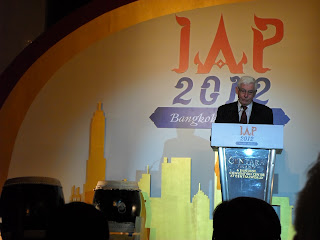Prosecutors Discuss Antiquities Trafficking at International Conference
 |
| IAP President James Hamilton of Ireland. |
“Impunity undermines the rule of law,” said UN Special Rapporteur Gabiela Knaul as she advocated for accountability of organized crime participants. One method of enforcement suggested by Kier Starmer, head of the United Kingdom’s Crown Prosecution Service, is to prosecute offenders and seize criminal assets, followed by post-conviction financial reporting by defendants in order to deter repeat offenses.
One of the IAP’s stated objectives is “to improve cooperation between prosecutors to more readily combat international criminality.”
This post is researched, written, and published on the blog Cultural Heritage Lawyer Rick St. Hilaire at culturalheritagelawyer.blogspot.com. Text and photo copyrighted 2012 by Ricardo A. St. Hilaire, Attorney & Counselor at Law, PLLC. Any unauthorized reproduction or retransmission of this post is prohibited. CONTACT: www.culturalheritagelawyer.com

